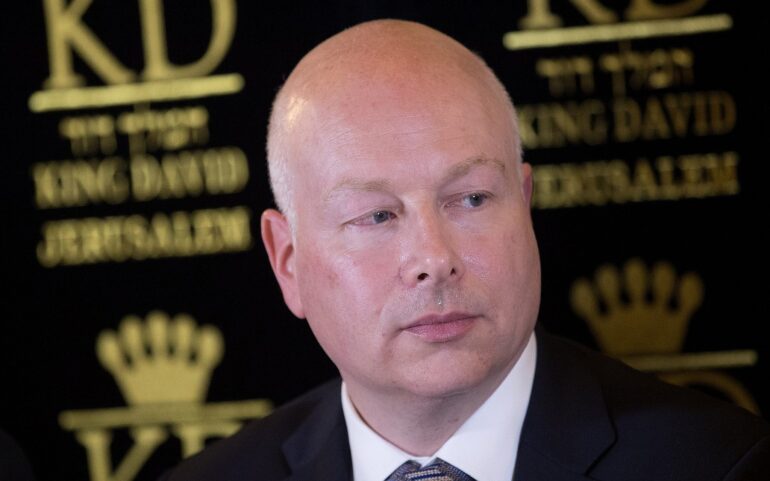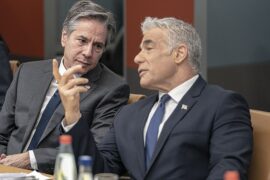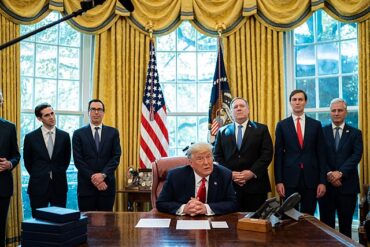Israel’s channel 10 reported on Monday that Jason Greenblatt, the Trump administration’s special envoy to the Middle East, held secret talks last month with Tareq Abbas, son of Palestinian Authority President Mahmoud Abbas.
Israeli officials stated that during the meeting, the younger Abbas made it clear to Greenblatt that there is no chance of implementing Washington’s two-state agenda. It was reported last week that support for partitioning the country into two states has reached an all time low for both Palestinians and Israelis.
Abbas, who is a major leader in the Palestinian business community, advocated instead for a one-state solution with equal rights for all citizens.
The White House team charged with drawing up the plan is led by Greenblatt, United States Ambassador to Israel David Friedman and President Trump’s advisor and son-in-law Jared Kushner.
The Israeli officials, who wished to remain anonymous, told channel 10 that Greenblatt sought to establish contact with one of Mahmoud Abbas’s closest associates as the Trump administration pursues its plan to partition the country into two separate states.
During the meeting, however, Tareq Abbas surprised Greenblatt by revealing that, unlike his father, he is opposed to the two-state solution, which he believes is no longer feasible due to the expansion of Jewish communities in the West Bank.
“I support a one-state solution between the Jordan River and the Mediterranean Sea, with equal rights for all citizens.”
The meeting took place a few days after President Trump met Abbas’s father at the United Nations General Assembly in New York. It’s been rumored that the president wants to keep focus on partition and has been working to discourage any one-state conversations.
Trump reportedly told Jordan’s King Abdullah II at the White House a few weeks ago that, in the absence of a two-state solution, Israel will have “a prime minister named Mohammed” in a few years time.
Trump’s reported remark was detailed on Sunday night by Channel 10 news, which described it as “sarcastic” and “semi-jocular,” but also expressed Washington’s insistence that discussions remain focussed on partition.
Channel 10 said its report had been confirmed by an Israeli and a former US official, who had both been briefed on the White House meeting, but that both the White House and the Jordanian Embassy in DC have refused to comment.
According to Channel 10’s Barak Ravid, who later Sunday posted an English version of his story on the Axios website in which he cited unnamed “French diplomats” as his source, the US president’s comment to Abdullah was in turn relayed by the Jordanian king to the French Foreign Minister Jean-Yves le Drian, during a meeting they had in Amman on August 2.
Relating for Le Drian his White House conversation with the US president in late June, Abdullah reportedly said he had informed Trump that “Many young Palestinians don’t want the two-state solution anymore, but would rather live together with the Israelis in one state with equal rights for all.”
Trump reportedly replied that “What you say makes sense… [In a one-state scenario,] the prime minister of Israel in a few years will be called Mohammed.”
Elsewhere in the conversation, the king reportedly urged Trump, “Don’t present your [peace] plan now: There are too many difficulties right now. There’s no need to hurry to present the American peace plan.”
Trump reportedly responded that “I want to advance a peace agreement in the Middle East, because if my administration cannot achieve a deal, no administration will be able to.”
Israelis shouldn’t be concerned or influenced by Trump’s fear mongering. The death of the two-state solution is an opportunity for us to have serious conversations that we’ve until now been avoiding. For decades, Israelis and the broader Jewish world have relied on the two-state solution to gerrymander a Jewish demographic majority in whatever’s left of a truncated European-style nation-state with shallow Jewish decorations.
The fantasy that Israel was in the midst of a process aimed at partitioning the country into two states allowed our society to stave off public discussions about the nature of our state’s Jewish and democratic characters. We returned to our land after thousands of years in exile in order to recreate something beautiful that will inspire the world. Accomplishing this obviously requires not only the territorial integrity of our homeland but also policies and institutions that fully express our people’s ancient culture and values. In order to effectively resist Washington’s two-state plan, Jewish activists will need to find common ground with Palestinian one-staters and to clearly define what it means for our state to be both deeply Jewish and fully democratic for all peoples between the Jordan River and the Mediterranean Sea.





